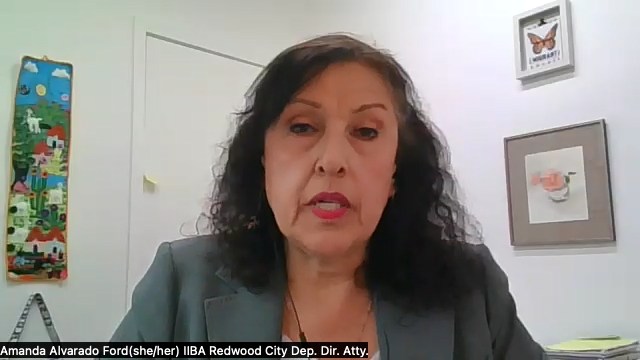Trump crackdown: 200,000 immigrants rounded up, 8,000 deported by ICE; experts cite rights of immigrants
By Cesar Antonio Nucum Jr.
SAN FRANCISCO – In fulfillment of its promise to act decisively on illegal immigration, the Trump administration through the Immigration and Customs Enforcement (ICE) reported more than 200,000 believed to be undocumented immigrants have been arrested in only its first month of the crackdown and at least 8,000 of them have been deported.
Most of those arrested and deported were from South and Central America with a significant number coming from India, China and Russia. The number is expected to further increase as ICE is supposedly tasked to arrest at least 1,200-1,500 people per day.
A few undocumented Filipinos were among those arrested and deported or are being processed, according to Philippine authorities. (See related story)
In its February 7, 2025 national briefing, “ICE Is Knocking What Are Your Rights?,” Ethnic Media Services had the guest speakers discuss how immigrants can protect themselves when ICE agents show up at homes, workplaces, and even schools and inform those apprehended of their rights while in ICE detention.
Those who spoke in the briefing included Deputy Directing Attorney, Immigration Institute of the Bay Area Amanda Alvarado-Ford, Immigration Activist and founder of the group La Resistencia and CEO of Latino Advocacy Maru Mora-Villalpando, ImmSchools Founder Viridiana Carrizales and Staff Attorney with the ACLU Immigrants’ Rights Project Oscar Sarabia Roman.
Alvarado-Ford spoke about the people’s rights when ICE comes knocking at one’s door and the types of advice that they give to their clients at Immigration Institute of the Bay Area.
“We emphasize this is not the time to panic. What we want to do is recognize that we have rights, that we have power. And so it is a message of power, not panic. As undocumented people here in the US, we still are entitled to constitutional protections, especially the protection to remain silent and also the protection and the right to be free from unlawful searches and seizures,” Alvarado-Ford said as she allayed fears of undocumented immigrants.
She advised those undocumented and have been for more than two years in the US that they have the right to a hearing that can be bolstered with proof of documents of the two-year stay before an immigration judge.
“If I’m undocumented, but I’ve submitted an application either for asylum for a U visa for survivors of crimes who are immigrants here in the US, a T visa if I’m a survivor of trafficking here in the US or VAWA for victims of domestic abuse, either by a lawful permanent resident spouse or USC or lawful permanent resident child over the age of, I want to have a copy of that receipt notice probably actually on the photos in my phone that I have that just in case I need it. In case I have no choice but get arrested by ICE and I need to explain that I’ve got a process pending,” explained Alvarado-Ford.
Alvarado-Ford also emphasized that in the scenario of a pre-arrest by ICE, one has the right to remain silent and that is a really important right as one doesn’t want to say anything nor want to lie to an ICE official and that right can be asserted in a respectful way so as to avoid any undue harshness on the part of an ICE agent.
“We also want to remember that if we encounter an ICE agent at our front door, we have the right to remain silent and to insist upon a judicial warrant sent through a post box that can be accessed inside the house without having to open the door, can be slid under the door or dan be held up to the window. We don’t want to open a door to ICE at home in the absence of a signed judicial warrant coming from the US District Court signed by a judge and not just by any immigration officer,” stressed Alvarado-Ford.
“If it doesn’t meet the standard of the US District Court signed judicial warrant, we can respectfully ask them to leave.”
She reminded anyone to carefully scrutinize the warrant carefully, not feel rushed and always remember one’s rights. ‘And once we realize that it is a valid ICE warrant for immigrant for alien arrest, then we want to tell respectfully the ICE officer that you have the right to remain silent, and that you also have the right to speak to you immigration attorney,” Alvarado-Ford said.
“And one should not hesitate to speak on your right to speak to a lawyer whether one has an immigration attorney or not, because one can always obtain an immigration attorney or one’s family can obtain one. Make sure that they do not execute any unlawful searches or seizures of people or property.”
Immigration activist Villalpando’s La Resistencia, a grassroots community group in Tacoma, Washington that has been around for eleven years responded to the largest hunger strike so far in a detention center back in March 2014 of where over 1200 people went on hunger strike and called for the support of their group and since then worked directly with people in the Tacoma detention center and their loved ones to make public that attention conditions. Last year,
Resistencia kept track of how many hunger strikes happened. And just last year, there were fourteen hunger strikes recorded and many more have not been monitored and recorded by their group.
“The main demands that people have had throughout the years about going for the reason why they go on hunger strike is horrible quality of food. Usually, it’s not a problem to go on hunger strike because we don’t need the food anyway. Another is the lack of clean clothing as people who arrived at the detention center, for years, have not given new uniforms or new underwear that may have already being worn by somebody else and they can’t tell,” Villalpando said.
“Also, completely lack of medical attention and, at times, it’s completely negligence, medical negligence.”
Carizales, herself was an undocumented student being a daughter of parents who are similarly undocumented, a co-founder and chief executive of ImmSchools, discussed the rights children have when ICE shows up at a school site, and on how educators and parents can work together to mitigate fears for students and their parents and create safe havens at schools.
“Students should never be afraid of the same places that are meant to protect them but recent changes in policy, especially those changes that impact schools or kids in our schools, has caused a lot of fear in immigrant parents who are questioning now whether or not they should bring their kids to school and indeed some parents have already withdrawn their kids from school,” Carizales said.
“There are approximately 5.5 million children in K through 12 who are either undocumented or who reside with one undocumented parent. The majority of them are U.S. Citizens– kids that were born in this country that have undocumented parents,” Carizales added.
Carrizales cited the landmark decision in a Supreme Court case Plyler v. Doe which ruled that that every child in this country, regardless of their immigration status and regardless of their parents’ immigration status, have the legal right to be in K through 12 schools and also shared about Family Educational Rights and Privacy act (FERPA) which protects the privacy and confidentiality of our students records.
Any information that a parent shares with the school is protected under this Privacy Act.
Atty. Roman of the ACLU discussed how civil rights organizations are pushing back to fight Trump’s deportation directives starting with the one ACLU filed against the executive order on birthright citizenship. Birthright citizenship is the principle that every baby born in the United States is a US citizen and this principle is enshrined in the Constitution’s 14th Amendment which guarantees the citizenship of all children born.
In the United States there’s only one narrow exception of children of foreign diplomats. The other move ACLU was opposed was the so-called attack on asylum which the Trump administration is also seeking to completely shut down asylum at the border which Roman claimed would put thousands of lives at risk.
“The proclamation specifically, which falsely cites quote “an invasion, as justification” to deny asylum. Families and individuals face return to countries where they are at grave risk, and prosecution with absolutely no recourse. But Trump’s actions here ignore explicit protections, and this is important, that were put in place by Congress and backed by the courts for generations that ensure people have a chance to have their asylum claims heard. This proclamation really is unprecedented compared to previous attempts to shut off asylum because this move leaves absolutely no avenue open where people just seek asylum at the border,” expounded Roman.
“We are suing to stop this ban on asylum. Because no precedent has the authority to unilaterally override the protections that Congress has explicitly afforded those fleeing danger.”


















